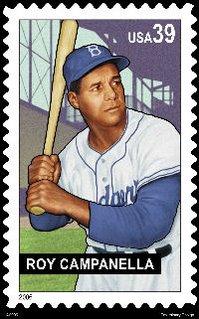CROWE'S NEST
By Jerry Crowe, Los Angeles Times Staff Writer
December 25, 2006
Not everything was for sale this holiday season.
A Claremont man, for instance, discovered in an old box a rare, vintage recording of an immensely popular and critically acclaimed artist, spent hours digitizing it to improve the sound quality and transfer it to CD, ignored advice from friends and co-workers to auction it off to the highest bidder and happily handed it over to the company that signed the artist more than 50 years ago.
He did this, he said, out of respect for the artist and the artist's equally revered subject.
"I just wanted to do what was right," he said.
His name is Jim Governale and the recording is of word-painter extraordinaire Vin Scully's over-the-air description of the final inning of the Dodgers' 5-0 victory over the New York Mets on June 30, 1962, at Dodger Stadium, the only known surviving audio account of the first of Sandy Koufax's four no-hitters.
The recording was made by Governale's uncle, Dave Fantz, who was 14 years old and sensed Dodgers history in the making when he fed a tape into his father's reel-to-reel recorder. About 40 minutes long, it picks up in the bottom of the eighth inning and carries through Jerry Doggett's postgame interview with Koufax.
The Dodgers were thrilled to receive a copy last month.
"This is really, truly a gift he's giving to the club," team historian Mark Langill said. "The magnitude of this is monumental, historically and emotionally."
No commercial video recordings of Koufax's no-hitters are known to exist, and no audio accounts of his second and third no-hitters have surfaced. Scully's poetic description of the final half-inning of the great left-hander's perfect game against the Chicago Cubs in 1965 was preserved only because Scully phoned the radio station in the eighth inning and suggested that it record the ninth.
As Scully is well aware, Governale's recording could have wound up just as easily in an online auction as in the Dodgers' hands.
"Some of my canceled checks from 40 years ago are up on EBay," Scully said. "It's really a joke."
Up to his neck in holiday preparations — he has 16 grandchildren — Scully had not heard Governale's recording when contacted for this article.
But he planned to listen and was touched by the gesture.
"I have it and I will treasure it," he said of the recording. "What will be the highlight for me is that Jerry Doggett, whom I loved, is on the CD. I've heard me, so that's that. But to be able to hear Jerry is really precious for me."
The Dodgers, Langill said, plan to post excerpts of the recording on their website starting this week.
Governale, a 40-year-old father of four and an on-air personality at a Glendale radio station, discovered the recording 16 years ago, after his grandfather died. His grandmother gave him a box of old tapes, and a newspaper clipping on the outside of the box indicated that it contained a recording of a Koufax gem.
Though a self-described "huge Dodger fan," Governale also is a procrastinator. He said he didn't actually listen to the recording until about 10 years ago, when he brought it into work, cleaned it up and burned it onto a CD.
"It was a real special recording and one of the first things that came to my mind was, 'I really want Vin Scully to hear this,' " he said. "In the back of my mind, I thought, 'One of these days I've got to mail this to Vin Scully.' "
But he didn't realize it was a rarity until about five years ago, when he contacted Cooperstown and was told the Hall of Fame did not have a copy.
That's when Governale's friends and co-workers weighed in.
Sell, they said.
He thought about it.
Through a co-worker, he contacted a copyright lawyer.
In the end, though, he believed that profiting from the recording would be unseemly and diminish his joy in sharing it.
"I just wanted to do what was right by the Dodgers and Vin Scully and Sandy Koufax," he said. "It would mean more to me to honor the two of them by just doing the right thing, rather than just to sell out. To me, it seemed like a way of cheapening the recording and cheapening the find if I were to sell it."
His co-workers, he said, thought he was "a little nuts."
But his uncle, who had been consulted, was not surprised.
"That's just the way Jim is," Fantz said from Denver, where he is an executive at a healthcare company. "He talked to me about it and I think it took me about a nanosecond to agree with him. It's just a stroke of luck that I happened to turn on the recorder that day, and that the recording has preserved all this time."
Also fortunate, the Dodgers might add, was that it wound up in the hands of Jim Governale, a true-blue fan and an honorable man.





